In this article, we’ll go over some social proof statistics to show how powerful using social proof can be for your business.
What is social proof? Here’s a quick example:
Imagine you are walking down the street and you have to choose between three different ice cream shops. One of them is empty, and the other two have a few people in them. Which one are you going to choose?
If you’re like most people, you’ll likely choose one of the two with people in them.
That is the basic concept of social proof, and most smart marketers know to use this in their marketing tactics in order to improve brand presence, drive more traffic, and increase sales.
The Psychology Behind Social Proof
Whether we realize it or not, humans are pack animals. We need one another, we need to feel a sense of belonging, and we need socialization. And because of this, our decisions are consciously or subconsciously influenced by the choices, opinions, and actions of the people around us.
When making a purchase decision, our brain looks for a mental shortcut that will allow us to make a decision, pass judgment, or solve a problem quickly and with the least amount of mental effort.
In other words, to learn what is correct, we look at what others are doing or have done in the past.
Not only do we look to others for buying decisions, but we also depend on it for almost everything else we do.
Psychologist Robert Cialdini writes in his bestselling book Influence: The Psychology of Persuasion, “Whether the question is what to do with an empty popcorn box in a movie theater, how fast to drive on a certain stretch of highway, or how to eat the chicken at a dinner party, the actions of those around us will be important in defining the answer.”
In short, social proof is a shortcut to decide how to act.
What Social Proof Can Do For Your Business
Incorporating social proof into marketing efforts has allowed many startups and small companies to grow in popularity and see a spike in sales.
Implementing social proof such as recent customer activity takes less than five minutes to set up and deploy on your site with a great social proof tool like TrustPulse. And, it can boost conversions by up to 15%.
An example of social proof would be displaying something like: “Laura from Vancouver, Canada recently purchased the Turbo Traffic tool”, or including customer reviews on your product pages.
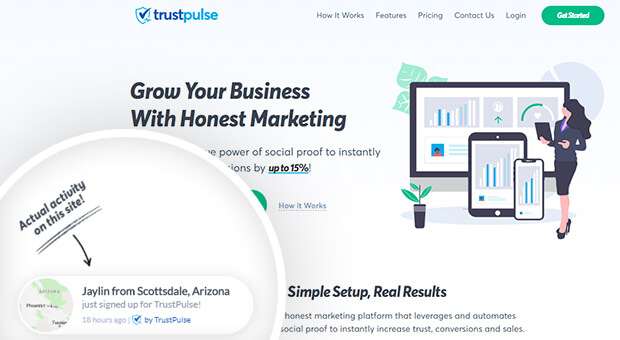
In particular, social proof has helped companies:
- Build customer trust.
- Validate and simplify customer’s buying decisions.
- Add credibility for your business, and improve brand presence.
Let’s take a closer look at these three factors in the form of statistics.
Related Content: How to Use Social Proof & FOMO Marketing for Monster Growth
Use Social Proof to Build Customer Trust
Savvy consumers are often unwilling to trust marketers over honest real experiences from actual customers who have used the product.
Marketers have a reputation of often coming off as spammy, making people question whether the marketer’s product is actually any good, or if they’re just boasting about it to convert you into a customer and make a quick sale.
That’s why it’s so important to make your company reviews available for everyone to see.
After searching “plumber” in Google, this company’s reviews page popped up first. This is a great example of social proof as it helps put potential customers at ease.
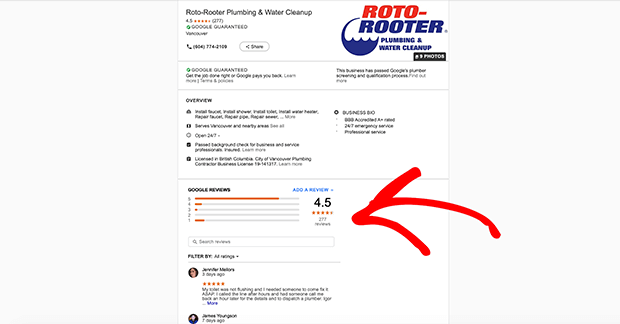
Social Proof Statistics: Building Trust
- 87% of buying decisions begin with research conducted online before the purchase is made.
- The average consumer reads 10 online reviews before making a purchase decision.
- 88% of consumers trust user reviews as much as personal recommendations.
- 82% of Americans say they seek recommendations from friends and family before making a purchase.
- 64% of consumers need to hear company claims 3-5x before they actually believe them.
- 70% of people will trust a recommendation from someone they don’t even know, and 92% of people will trust a recommendation from a peer.
- 75% of consumers are “always” or “regularly” reading online reviews.
- Shoppers across all age ranges expect an average of 112 reviews per product when they search online.
- Shoppers in the 18- to 24-year-old range expect an average of 203 reviews per product page.
- 85% of consumers think that online reviews older than 3 months aren’t relevant.
Customer reviews and testimonials can be so crucial for sales that Casper went as far as suing a blogger for not recommending them as the best. They later ended up just purchasing the blog outright and putting themselves at the top of the list.

Use Social Proof to Validate and Simplify Customers’ Buying Decisions
It’s hard to make buying decisions when the market is saturated with so many options. The number of options often put buyers into decision paralysis.
Often times, reading reviews and testimonials are what push people towards the final buying decision.
Social Proof Statistics: Buying Decisions
- Testimonials can increase conversions on sales pages by 34%.
- For 50% of all consumers, their very next step after reading a positive review about a company is to visit their website, which is one step closer to the checkout, or even getting them on your email list.
- 57% of consumers will only buy or use a business service if it has at least a 4-star rating.
- 97% of consumers say online reviews impact their purchasing decisions.
- 93% of people who use mobile to research complete the purchase of a product or service.
- Consumers will engage only with a minimum business star rating of 3.3.
- Customers are willing to spend 31% more on a business with excellent reviews.
- one-star increase in Yelp rating leads to a 5-9% increase in revenue.
- Between similar products online, 35% of consumers said better reviews have driven them to spring for the higher priced option.
- Positive reviews make 68% of buyers more likely to use local businesses.
Influencer marketing: A Near-Instant Way to Build Credibility and Grow Brand Awareness
People follow their idols.
If someone you trust and respect uses a product, you automatically assume that it’s high quality and “worth using.” And in a sense, if someone like the influencer Pewdiepie is using it, it makes the product seem cooler.
Social Proof Statistics: Influencer Marketing
- Influencer marketing has been considered the fastest-growing consumer-acquisition channel.
- Content from influencers earns more than 8 times the engagement rate of content shared directly from brands, especially among younger millennials.
- 14% of consumers aged 18+ say celebrity endorsements have an effect on the things they buy.
- 40% of people say they’ve purchased a product online after seeing it used by an influencer on social media.
- X (formerly Twitter) users have a 5.2 times increase in purchase intent after seeing promotional content from influencers.
- 49% of users rely on recommendations from influencers on Twitter.
- Businesses are averaging $6.50 for every $1 spent on influencer marketing, with the top 13% earning $20 or more.
Related content: Want more stats? Here’s a giant list of blogging stats and facts.
How OptinMonster Uses Social Proof
There are so many ways to use social proof and OptinMonster uses a few tactics.
First of all, we have an entire page of customer testimonials from real people.
Research says that people are more likely to believe claims if there are images. Plus, we know that people enjoy seeing other human faces on the internet, so including photos of the people who are giving the testimonials works well.
Here is an example of our testimonials page.
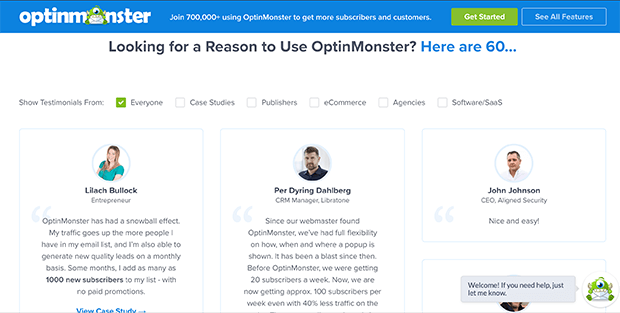
Second, we sometimes use social proof with urgency.
Using a countdown timer can make people think they’re going to miss out on a great opportunity, triggering fomo (fear of missing out), which has worked for us to increase conversions.
Related Content: Unlock the Power of FOMO: 17 Clever FOMO Marketing Examples
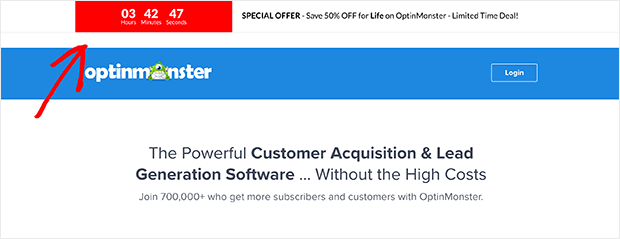
We showcase our popular posts and products in the sidebar. This shows that other people are interested in them, making it more appealing for new visitors to visit what is shown.
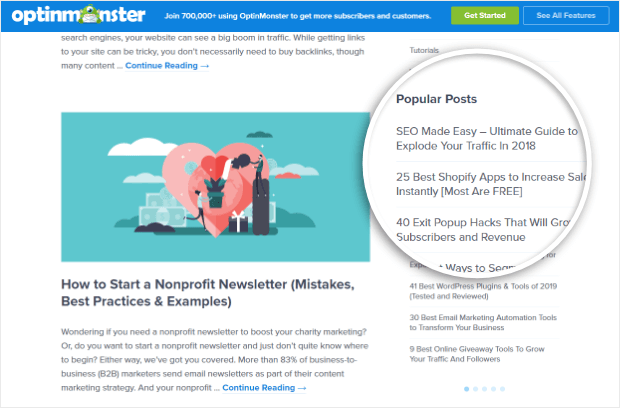
Lastly, we include real-time stats. This is not only a great way to show what other people are doing, but it adds to the fear of missing out.
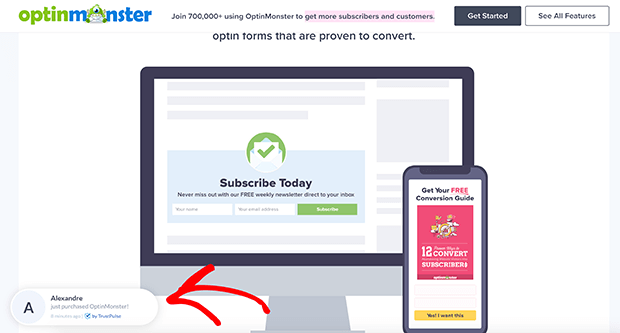
Those are just a few examples of what OptinMonster does for social proof. You can include these tactics on your website as well. But you don’t have to stop there.
There’s a ton of other ways to include social proof in your marketing strategies. The ones you choose will all come down to who your audience is, your goals, and what looks appropriate for your website.
The post Social Proof Statistics: Powerful Facts That Will Help You Boost Your Brand appeared first on OptinMonster.
Comments
Post a Comment